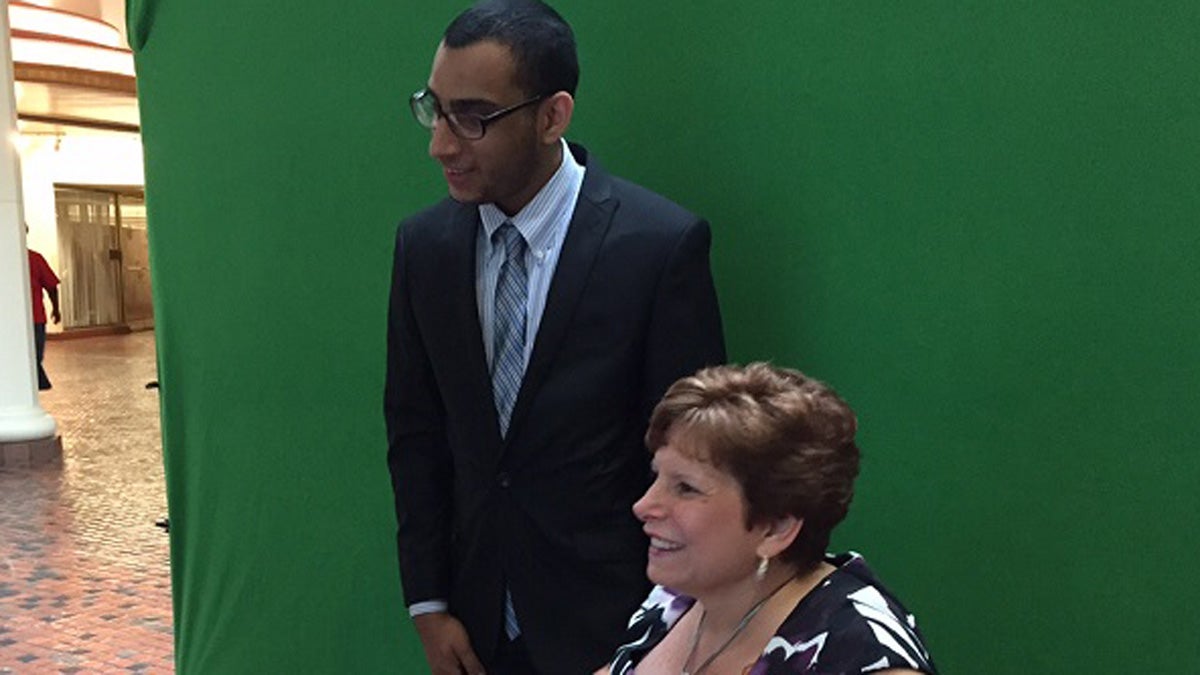In Pa. budget talks, disability groups relegated to the sidelines

William Del Toro is lobbying for more funding of a Pennsylvania office that helps people with disabilities find jobs that work for them by providing extras such as transportation, special workspace changes, and job coaching. (Mary Wilson/WHYY)
William Del Toro is a natural lobbyist. He doesn’t like noise or distractions, but in a loud, busy part of Pennsylvania’s Capitol one morning, he enthusiastically answered questions about job opportunities for people with disabilities.
“I’m going to tell you the truth,” said Del Toro, pushing his glasses up. “I don’t believe in the word, a disability. I think it’s just we’re all unique. We think a different way.”
Del Toro is with the #IWantToWorkCampaign, which is calling for more funding of a state office that helps people with disabilities find jobs that work for them by providing extras such as transportation, special workspace changes, and job coaching. The idea is to make it a little bit easier for people with disabilities go to work, so they can contribute a lot more to society.
“I’m sorry, can we please hold again?” Del Toro asked, rushing up an escalator to shake the hand of Labor & Industry Secretary Kathy Manderino. Del Toro is the campaign’s lead legislative liaison and, as such, if he spots a lawmaker or state official, he’ll stop, midsentence, to run after them and reintroduce himself.
“I actually recognize all our representatives … and all our senators,” said Del Toro, in his early 20s. “I have a specialty with names and faces.”
As a kid, Del Toro was told he had a learning disability. It wasn’t until high school that he was diagnosed with autism. He would have liked to have more job opportunities, he said. His current position with the #IWantToWorkCampaign is his first real job.
Del Toro is one of many trying to bring services for people with disabilities out of the funding doldrums. For the past few years, money has been kept relatively level, even as the demand for services has grown.
State budget negotiations are still playing out in Harrisburg, with the GOP-controlled Legislature trying to strike a deal with Gov. Tom Wolf, a Democrat. But taxes and education spending remain at the center of the debate, and disability groups are worried they’re being forgotten.
A former leader has fallen behind
Pennsylvania used to be a leader in disability services, advocates say. The state has fallen behind — and there isn’t much hope that this is the year of the turnaround.
“I’m not optimistic,” said Maureen Cronin, director of The Arc of Pennsylvania, which advocates for people with intellectual and developmental disabilities. “I do worry that people with disabilities are being lost in this debate.”
Cronin’s top priority is wiping out a waiting list. People with intellectual disabilities are served by their school district until they turn 21. But after that, many wait for years to find out if they’ll keep receiving services — the kinds of instruction and assistance that could help them stay active, whether in a job or a volunteering position. Advocates say more than 14,000 people are on the waiting list now.
Sarah Holland’s family was on an emergency subset of that waiting list for three years. Holland, who lives in Lancaster County, said her son Ian has received services since he was just a few weeks old for intellectual disabilities and medical issues.
“Ian can’t be by himself even for a minute,” said Holland. “He needs to have eyes and ears on him at all times.”
Ian is nonverbal, so to have some control over how his day goes, he uses an iPad that’s been set up to give him multiple-choice questions.
“In order for it to work for him, somebody else needs to program what his options are to say,” said Holland. “He can’t choose himself.”
Some people age out of the system before they leave the waiting list – the school district’s services stop before new, state-funded services begin. That would have been a challenge for Holland’s family.
“My husband would have to quit his job, and we would have lost half our income,” said Holland. “And we wouldn’t have been able to pay our mortgage.”
A month before services were set to end, Holland found out the funding would come through for Ian.
“It’s a huge relief,” said Holland. “It’s huge.”
Years of waiting
But thousands of other families are still waiting.
In some ways, disability rights advocacy in Pennsylvania is a success story. The movement has friends in both parties. Legislative leaders are sympathetic.
But the push to deal with the waiting list is more than 15 years old. A proposal in the House would ask state officials to come up with a five-year plan to eliminate the wait. The bill has stalled for three straight legislative sessions.
It doesn’t help advocates that the Republican-controlled Legislature is nursing a severe allergy to raising taxes.
Cronin understands why lawmakers are wary of turning to taxpayers this year. She points to a survey of 1,000 Pennsylvanians commissioned by The Arc finding more than half of respondents would be willing to pay higher taxes to fund disability services.
“Constituents do not want to pay taxes just to go into big government,” said Cronin. “But … they are sure willing to pay increased taxes for the right things.”
Wolf is calling for a number of tax increases, and disability services would get a piece of that funding under his proposed spending plan. But longtime political observers say Democrats and Republicans are so far apart on budget priorities that they’ll have to meet in the middle. Even then, that middle ground wouldn’t be enough to meet the high demand for disability services.
WHYY is your source for fact-based, in-depth journalism and information. As a nonprofit organization, we rely on financial support from readers like you. Please give today.

